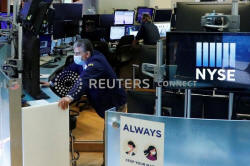Market volatility prompts investors to seek out
long-short equity
 Send a link to a friend
Send a link to a friend
 [September 25, 2020] By
Maiya Keidan and Megan Davies [September 25, 2020] By
Maiya Keidan and Megan Davies
LONDON, NEW YORK (Reuters) - Stretched
valuations and the resulting pullback in equities have prompted more
interest in long/short fund strategies that can provide some protection
against market declines and wild swings, hedge fund and asset managers
say.
The S&P 500 index is down nearly 10% from its Sept. 2 peak, and the
burst of selling has prompted some managers to seek more protective
strategies. The recent selling followed a run-up in stocks, which
regained all their coronavirus-induced losses after unprecedented
support from the U.S. Federal Reserve.
Long-short equity hedge funds, which bet on stock prices rising and
falling, lost an average of 5.75% in March when markets plunged. But
they went on to gain an average of 13.67% in the first eight months of
2020 and were the best-performing strategy in August, according to data
from investment bank Nomura.

"We see great demand for strategies that protect from great volatility,"
Philippe Ferreira at fund of hedge fund Lyxor Asset Management told
Reuters.
Part of the protection long-short funds offer is by "shorting" --
borrowing a stock or security from an institutional investor, then
selling it back when the price falls, pocketing the difference.
Fund research firm Preqin said that hedge fund equity strategies, which
includes long/short strategies, accounted for $929 billion of assets
under management at the end of June, of $3.6 trillion in total global
hedge fund assets.
"We are seeing flows into strategies that bring some form of
protection," said Ferreira. "We are not seeing flows into strategies
that are highly correlated to the market environment.
"There are many long-short that have a long bias and they are left by
the sidelines at the moment. Long-short equity that is less correlated
is in high demand."
Data from industry tracker eVestment shows searches for long-short
equity hedge funds on their database rose to a seven-month high in
August, making up 17% of all hedge fund searches, compared with 11.1% in
July.
Rob Christian, co-head of research and investment management at hedge
fund solutions group K2 Advisors, part of Franklin Templeton
Investments, said it's a "great time" for long-short investing and that
clients had been looking to get more defensive.
[to top of second column] |

Traders wear masks as they work on the floor of the New York Stock
Exchange as the outbreak of the coronavirus disease (COVID-19)
continues in the Manhattan borough of New York, U.S., May 27, 2020.
REUTERS/Lucas Jackson

"Broadly, equity investors are trying to reduce their equity risk using
long-short managers," Christian said.
For their part, hedge funds running long-short funds say they are seeing renewed
interest in the strategy.
"My view overall is that long-short equity generally fell out of fashion a few
years ago and there is just starting to be a little bit more interest, from our
experience," said Nigel Gliksten, partner at Toscafund Asset Management.
Gliksten said Toscafund, which runs a $400 million long-short fund, was
receiving more interested calls from investors since the pandemic hit.
"We have seen a big increase in inbound enquiries from family offices,
institutional investors and banks, to layer in long volatility risk-reducing
positions that would effectively create a long-short trade," said Matt Rowe,
chief investment officer at asset-management firm Headwaters Volatility.
While many of the hedge funds said investors were at the early stage of their
enquiries, some funds were already seeing inflows.
BlueBay's credit long-short fund almost doubled, to $219 million in July from
$126 million in October 2019, with the increase due to investor inflows as well
as performance, confirmed a spokesman.
The U.S.-based long-short credit fund Aristeia International rose to $1.3
billion in July from $1.242 billion in December, according to data compiled by
HSBC and seen by Reuters.
In long-short equity, Lee Ainslie's Maverick Fund rose to $1.5 billion in July,
from $1.4 billion in November 2019, showed the data.

Aristeia Capital and Maverick Capital did not respond to requests for comment on
whether the asset growth was due to more investors.
(Reporting by Maiya Keidan and Megan Davies, editing by Larry King)
[© 2020 Thomson Reuters. All rights
reserved.] Copyright 2020 Reuters. All rights reserved. This material may not be published,
broadcast, rewritten or redistributed.
Thompson Reuters is solely responsible for this content. |